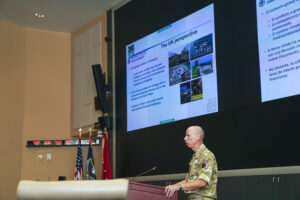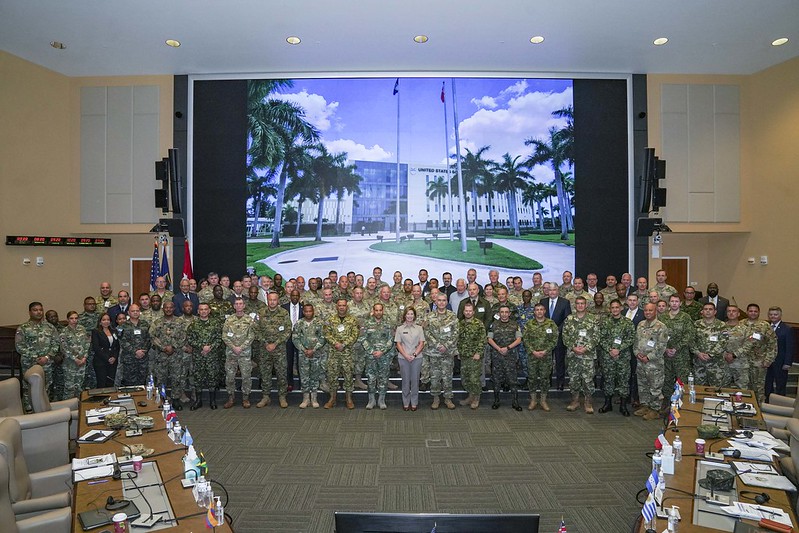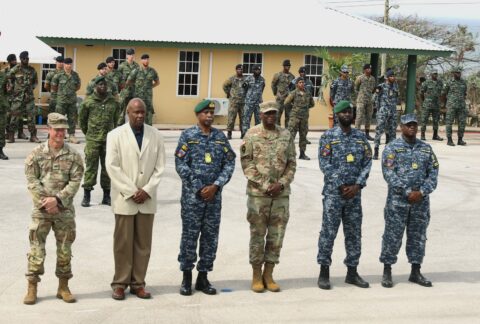Senior logistics leaders from 19 partner nations of the Western Hemisphere came together for the fifth U.S. Southern Command- (SOUTHCOM) sponsored Senior Leader Logistics Symposium (SLLS), in Doral, Florida, September 6-7.
Argentina, Barbados, Belize, Canada, Chile, Colombia, Dominican Republic, Ecuador, El Salvador, Guatemala, Guyana, Honduras, Jamaica, Netherlands, Panama, Paraguay, the United Kingdom, Uruguay, and the United States participated in the annual SLLS that promotes logistics, interoperability, and cooperation. The U.S. Department of Defense, Joint Chiefs of Staff, SOUTHCOM components, and other interagency organizations also participated.
“All of you are here representing your countries and representing this very important event… Logistics is hard. I mean, it’s really: Roll up your sleeves and figure it out or your readiness just plummets,” U.S. Army General Laura J. Richardson, SOUTHCOM commander, said in her welcome remarks.
Climate change and environmental degradation are posing a significant risk and affecting military readiness and security, Gen. Richardson said. By working together, the Western Hemisphere will be able to respond rapidly and collectively to disasters and record-breaking storms, droughts, floods, and other conditions, she added.
She praised attendees for their work in two SOUTHCOM-led initiatives: the Humanitarian Assistance and Disaster Relief (HADR) Logistics Handbook for the Western Hemisphere and the Theater Maintenance Partnership Initiative TMPI).
British Royal Air Force Vice-Marshal Richard D. Pratley, assistant chief of Defence Staff for Logistics and Support Operations, one of the key speakers, addressed the need for creating a cooperative strategy to support nations in times of natural disaster relief.
“You only need to look at the news to see the increasing consistency of extreme weather events. El Niño this year, the way that the weather and nature don’t care which country you’re in. If you’re in its path, you are going to be a victim. The best way to deal with that is to work together, to share ideas and resources, and as with a lot of things to do with logistics, it’s about preparing early,” Vice-Marshal Pratley said.
The agenda
Participants exchanged views on strategic and operational logistics and readiness. They also gained understanding on how the use of logistics forces can support operations and opportunities for future cooperation and collaboration.
Lieutenant Colonel Robert Rodney, Guyana Defence Force Finance and Logistics officer, highlighted the importance of a collaborative approach to disaster preparedness.
“The SLLS allows us the opportunity to collaborate with other countries, to see where we stand in relation to our ability to contribute to disaster relief and to know that all of us are stakeholders in humanity […]. So even if we are not affected, we should be in a position to render assistance to any country within the Caribbean that may be affected by disaster because we are living in a disaster prone environment,” Lt. Col. Rodney said.
Changes in climate are leading to droughts and forest fires in Paraguay, said Colonel Carlos Daniel Silva Benítez, director of the Internal Control Standard Model Audit of the Paraguayan Armed Forces.
“The SLLS is very important for Paraguay and the region. It allows us to have common criteria on the principles and means that should be used in case of natural disasters, which is really a growing threat in the region […]. Sometimes alone we cannot respond, so with this joint effort it will make it possible for us to better face those challenges,” Col. Silva said.

HADR Logistics Handbook
The Handbook’s purpose is to offer recommendations on how nations might coordinate their logistics efforts in HADR operations in the Americas. With roundtables on the HADR Logistics Handbook, SLLS participants had the opportunity to address how the project should move forward.
There are currently 13 partner nations involved in the HADR Logistics Handbook project, which is estimated to be 65 percent complete. Future actions are still in process, such as the consolidation of procedures, emergencies responses, alignments with the United Nations, and approval authorities. The handbook will be tested at exercises Tradewinds 2024 and Panamax 2024.
Colonel Elvis Rafael Hernández Fernández, head of the Supply Directorate of the Dominican Republic Air Force, served as chairman of the Handbook’s Steering Committee (2022-2023). “During one year, we outlined the policies and standards that will guide the whole process of the development of the handbook.”
Captain Eduardo Torres Figueroa, head of the Logistics Department of the Chilean Joint Chiefs of Staff and chairman of the Handbook’s Movement and Transportation Working Group (2022-2023), said the completion of the handbook is very important.
“When we heard about the handbook we decided to participate actively. In 2010 we had a magnitude 8.8 earthquake, which demanded a lot of help both internally and from allied countries. We know firsthand what it is to have a natural disaster,” Cap. Torres said. “This also represents a way of giving back to the rest of our compatriots, to the rest of the Latin American community, with our experience to be able to participate in the preparation of this handbook.”
Brigadier General José Arsenio González, director of Logistics of the Joint Chiefs of Staff of the Honduran Armed Forces noted that Honduras is vulnerable to climate change due to its high exposure to climate-related hazards such as tropical storms and hurricanes.
“The handbook will help to standardize procedures, methods, and activities to be carried out in case resources are needed in different areas of the region that can be shared and that can be requested in case of disasters, natural emergencies, or other types of situations.”
Integration through the Theater Maintenance Partnership Initiative
“We want to understand the challenges that our partners are having with their equipment. This isn’t simply about fixing a truck or airplane or boat today but understanding the root causes. Some of this will be understanding what our partners want assistance with, a better way of communicating. Some will be finding efficiencies in our internal processes to try to work together to streamline, some will be educational engagement, and others will be finding new ways of engaging with our partners as peers to solve the logistics dilemma in our theater. We will reach that through partnership, through collaboration and thinking outside the traditional box,” U.S. Marine Corps Lieutenant Colonel Gabriel Christianson, multinational Logistics at SOUTHCOM J-4 Directorate, said about TMPI, which enhances hemispheric integration and stability through maintenance partnerships, and interoperability efforts.
The TMPI is a multi-year effort to build partner capacity in equipment maintenance, lifecycle management, and supply chain. TMPI looks at streamlined internal processes and promotes a maintenance culture, education, and professionalization.
Key component of the TMPI is the establishment of partner nation hosted Maintenance Training Centers of Excellence (CoE) to provide education on U.S. provided defense articles. Fiscal Year 2025 will see the opening of three CoEs: rotary aviation maintenance and electronic maintenance in Colombia and a multidomain, anglophone center at Caribbean Military Academy in Jamaica that will comprehensively cover land, sea, and air equipment.
“We are looking to invest in those CoEs to expand educational offerings, so that our partners in the region have access to high quality technical instruction, and that our partners that have the existing educational centers and specialized skills can take a leadership role in providing that education. We are looking to expand to a total of eight countries with nine CoEs, plus a Multinational Logistics Officer’s Course to be hosted by the War College in Colombia in partnership with the Institute for Security Governance with an eventual goal of linking the course to the NATO DEEP network of education offerings. We see TMPI as a holistic approach, a way to build the team,” Lt. Col. Christianson added.
Logistics ahead
Counter-drug initiative, humanitarian response, medical evacuation, and crisis planning effort begin and end with logistics, U.S. Major General Laura Lenderman, director of Operations of U.S. Transportation Command, told SLLS attendees.
“Logistics is the ultimate team sport. None of us can do it alone. Every partner nation and everyone in this room has talents and resources we need to bring to the table to ensure the success of the collective effort. We are truly stronger when we work across national boundaries, across services, and across domains.”
She added that nothing is more honorable than delivering aid or transporting someone to safety.
“It’s much more than a human operation than perhaps any other action you can take in uniform. We stand shoulder to shoulder to answer our nation’s call. Together, we are stronger and together we deliver.”









